Apostille Certificate: How To Authenticate Documents In DFA Philippines
Red Ribbon? Apostille? Ano ba yan? Hindi yan yung cake or nasa bible. They are both terms of the Department of Foreign Affairs that validate your documents or its origin. There are some documents that we need to pass abroad. Hindi kasi malalaman ng ibang countries if fake ba yung document, so they trust the government of the Philippines to verify our records. So if may “red ribbon” or “apostille” then the other countries would know it is legit. Here’s a guide on getting an Apostille in Philippines.
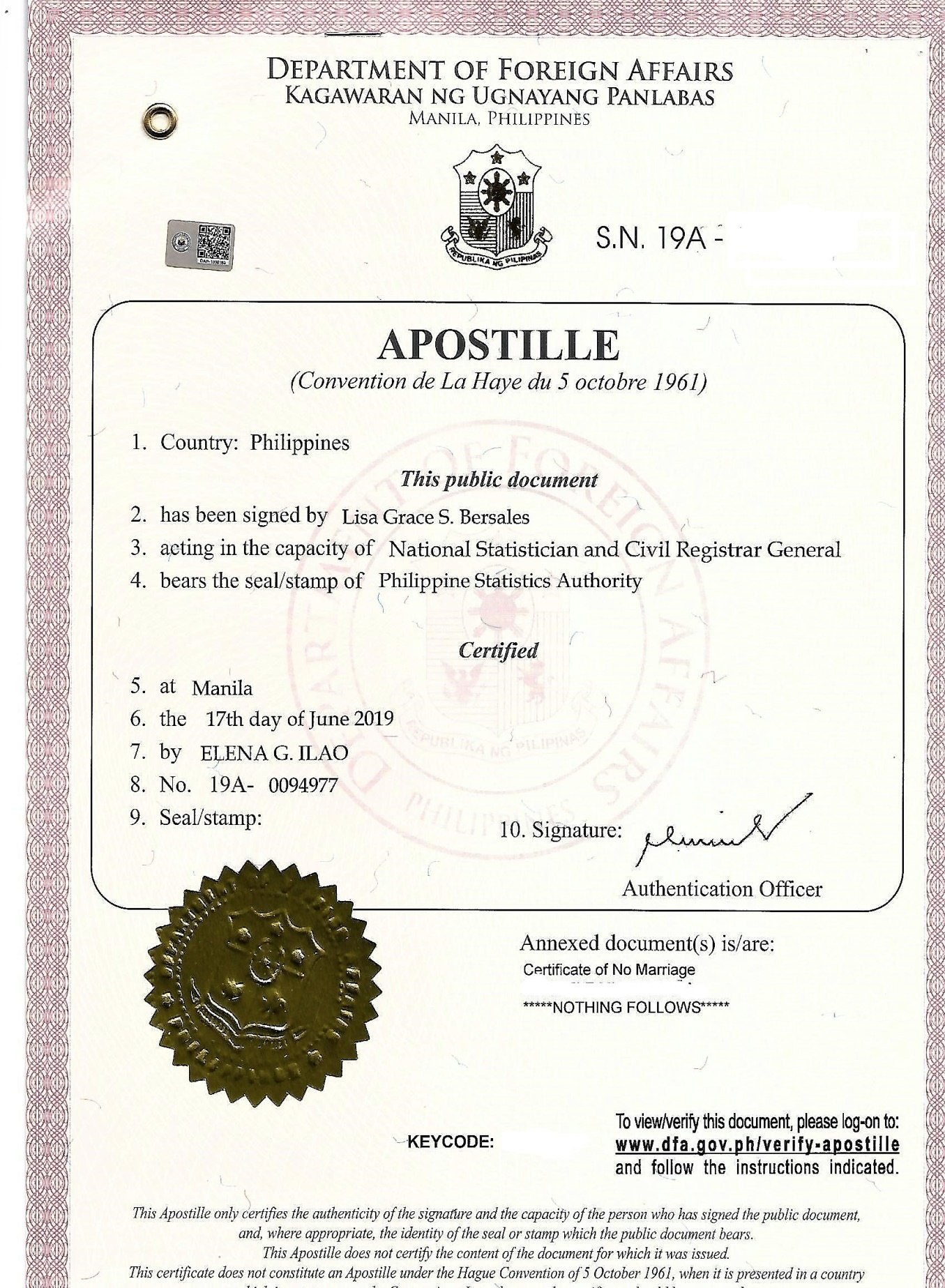
Before when you want to pass a document abroad “red ribbons” are affixed there to prove it is authentic, so may red na ribbon sa left side ng document at may gold sticker. It is a much longer process than today since kailangan pang i-present ang documents na may “Red Ribbon” sa foreign embassy.
As of May 14, 2019, the Philippines is part of the Apostille Convention, and there are no more “red ribbons”; an Apostille has a gold round sticker and a QR code. We will discuss it later.
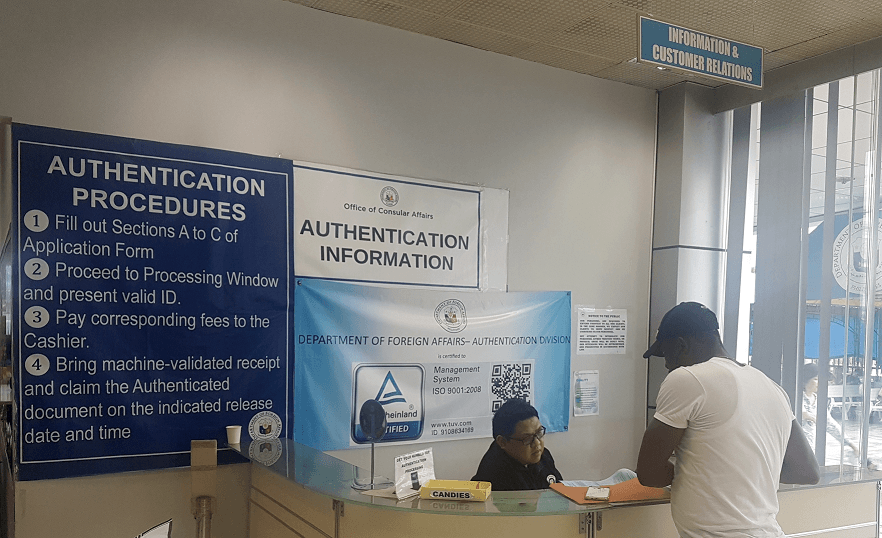
- How You Can Get a DFA Appointment for Philippine Passport Renewal
- 3 Ways on How to get a PSA Birth Certificate – Walk In and Online for Pinoys Abroad
- What To Do if Your Philippine Passport is Lost or Stolen?
- How to Get NBI Clearance Online [Guide to Online Application Registration for NBI]
- How To Get a Special Power of Attorney in the Philippines and Extra Tips for OFWs Abroad
Table of Contents
Apostille vs. Authentication “Red Ribbon”
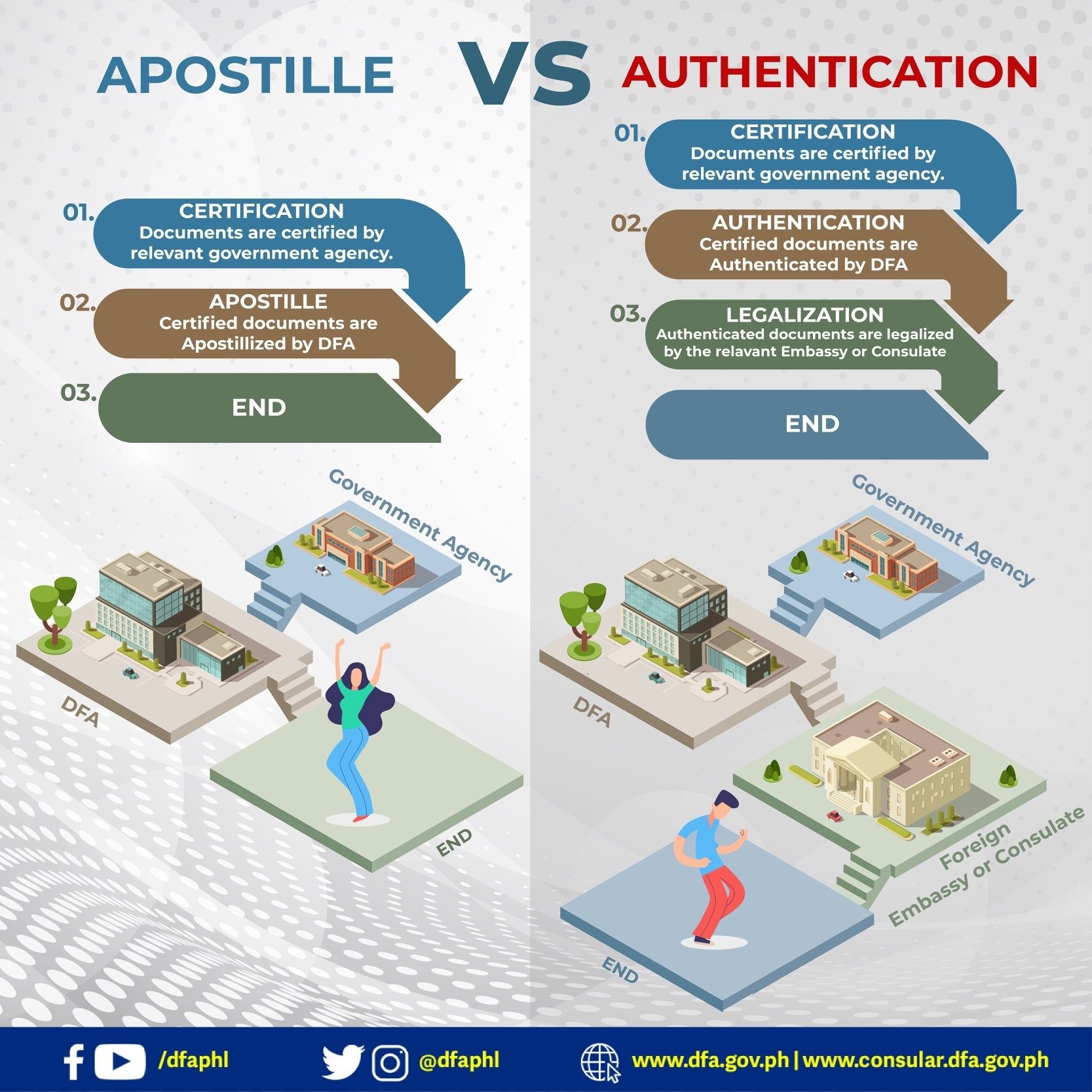
As said above, the Apostille is a much easier process than Authentication. It has 3 steps from Certification – Apostille – End rather than 4 steps in getting a “red ribbon” since you need to go to the Embassy or Consulate of the country that needs your document for its legalization or authentication.
Countries and Territories where Apostille of the Philippines is accepted
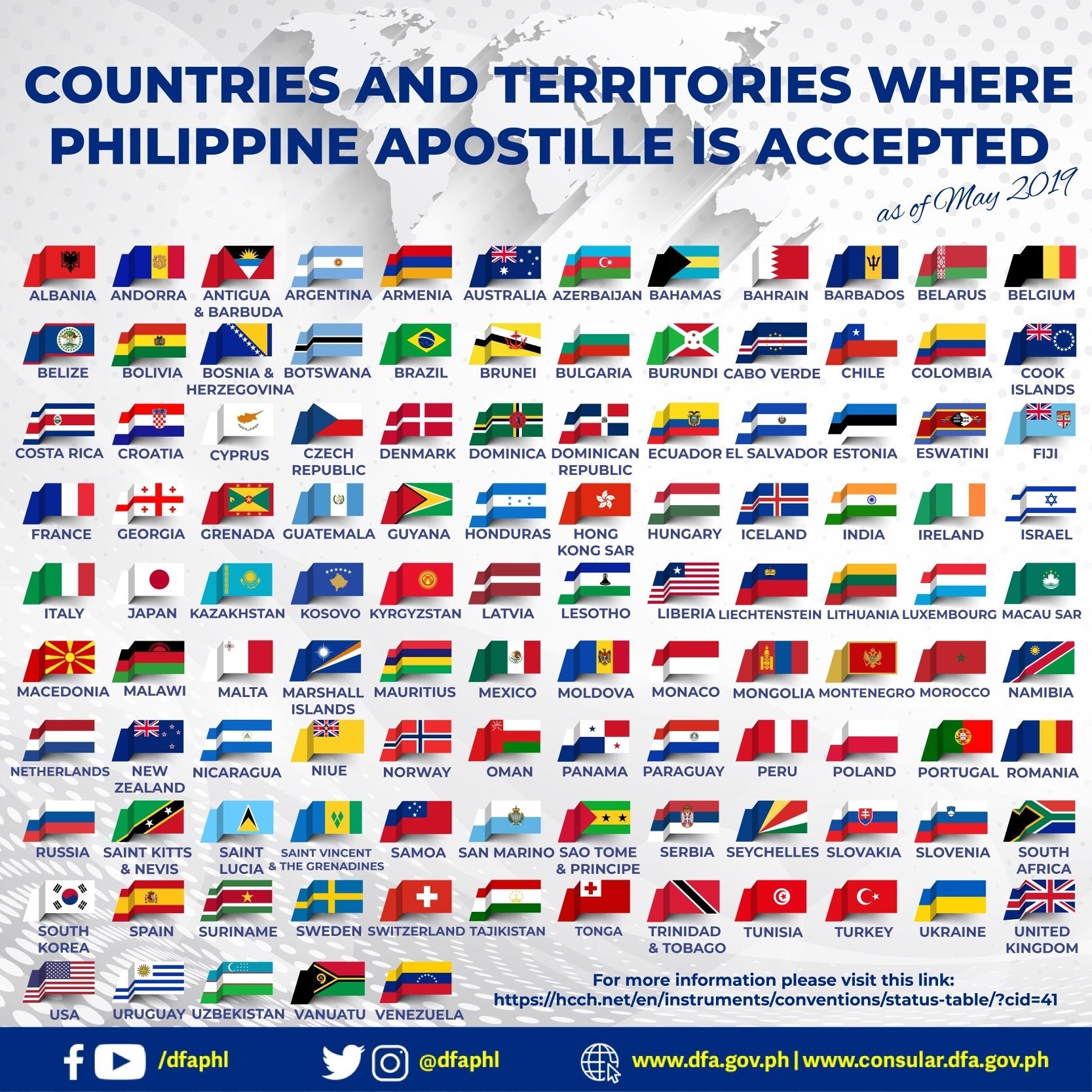
Please note that in case your document is submitted to a country that is not in this list, you need to go to the country’s Foreign Embassy or Consulate in the Philippines for the legalization.
Here are the countries where Apostille in the Philippines is accepted as per Apostille Convention Website:
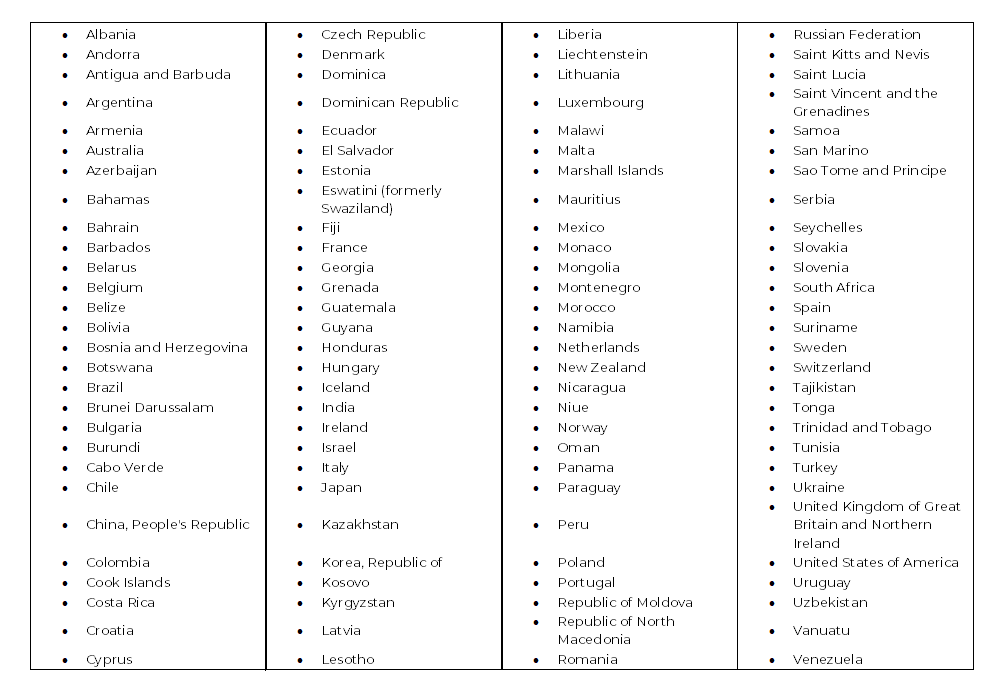
Though the following are members of the Apostille Convention, Philippine Apostille is not yet accepted by the following countries, and you need to go to their Embassy or Consulate for legalization:
- Austria
- Finland
- Germany
- Greece
All other countries not mentioned here, you need to go to their foreign embassies or consulate for legalization.
What are documents that can get Apostille in the Philippines?
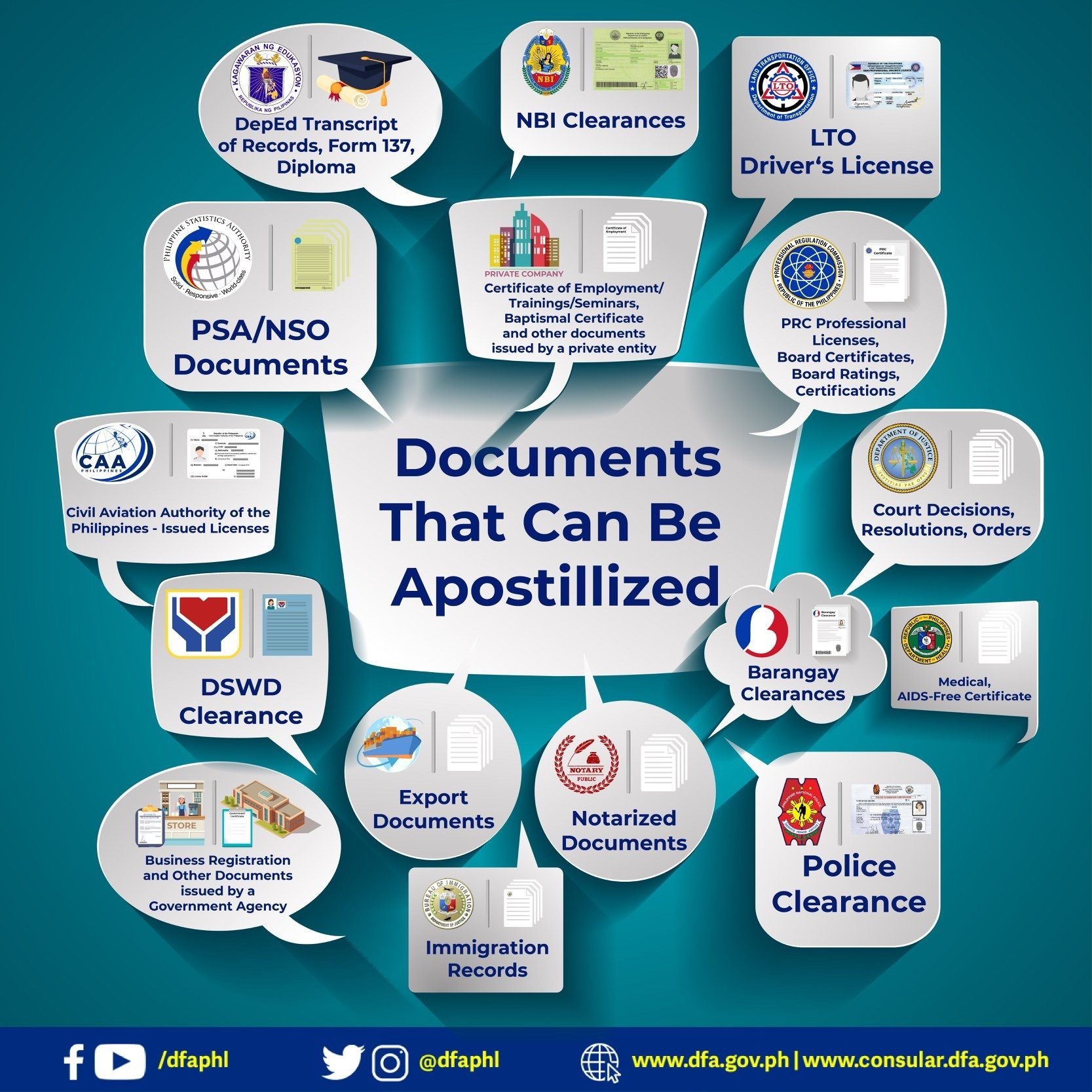
The documents are as stated by the Authentication Form:
1. NBI Clearance /Sundry – An original document issued by the National Bureau of Investigation (NBI) with dry seal Note: Personal copy is not valid.
2. Birth, Marriage, Death Certificate, or Certificate of No Marriage Record (CENOMAR, Advisory on Marriage and/or Negative Records)
- An original document issued by the Philippine Statistics Authority (PSA)/ National Statistics Office (NSO)
- For newly registered records, the Local Civil Registrar (LCR) copy should be certified by PSA.
Note: Provide an LCR copy of Birth (Form 1A)/Death (Form 2A)/Marriage (Form 3A) Certificate if the entries from PSA/NSO are UNCLEAR
3. School Documents
For Elementary and High School Level (Form-137 and Diploma)
- Certified True Copies from the school
- Certification, Authentication and Verification (CAV) from DepEd Regional Office
For Technical and Vocational Courses (TOR and Diploma/National Certificate)
- Certified True Copies from the school
- Certification, Authentication and Verification (CAV) from Technical and Skills Development Authority (TESDA)
For State Colleges and Universities (TOR and Diploma)
- Certified True Copy and Certification, Authentication and Verification (CAV) from the school
For Private/Local Colleges and Universities (TOR and Diploma)
- Certified True Copies from the school;
- Certification, Authentication, and Verification (CAV) from Commission on Higher Education (CHED)
4. Professional Regulations Commission (PRC) document/s – Certified True Copies from PRC
5. Medical Certificate/s
- For employment: DOH stamp per document
- For other purposes: Certification issued by DOH with attached Medical Certificate
6. Civil Aviation Authority (CAAP) issued document/s – Certified by CAAP
7. Driver’s License – Certification from Land Transportation Office (LTO Main Branch only)
8. Certificate of Employment/Invitation Letter/Trainings/ Seminars/ Baptismal Certificates and any other documents issued by a private entity
- Notarized Affidavit stating necessary factual circumstances and indicating certificate/s as attachment/s
- Certificate of Authority for a Notarial Act (CANA) signed by the Executive Judge/Vice-Executive Judge/any office authorized signatories (issued by the Regional Trial Court)
9. Special Power of Attorney/Memorandum of Agreement/ Memorandum of Understanding/Any other form of Contract/ Affidavit of Consent or Advice/Joint Affidavit/Other Affidavits
- Certificate of Authority for a Notarial Act (CANA) signed by the Executive Judge/Vice-Executive Judge/any office authorized signatories (issued by the Regional Trial Court)
10. Court Document/s (Decision, Resolution/Order) – Certified True Copies from the Court
11. Immigration Record/s – Certified by Bureau of Immigration (BI)
12. DSWD Clearance – Original document issued by Department of Social Welfare and Development
13. Police Clearance /Sundry – Original document issued by Philippine National Police (PNP)
14. Business Registration and Other Documents issued by a Government Agency (e.g. SEC, DTI, BIR, SSS, Municipal Business Permit & Licensing Office, etc.)
- A certified true copy from the issuing office
15. Barangay Clearance/Certificate – Mayor’s certification/clearance which has jurisdiction over the Barangay
16. Export Document/s – Certified by Philippine Chamber of Commerce (PCCI), Department of Health (DOH), Department of Agriculture (DA) or by the Bureau of Food and Drugs (BFAD), depending on the nature of the document
Requirements for Apostille or Document Authentication:
Here are the requirements you need when you go to the DFA Office beside the Document you want to Authenticate or Apostillized
- Original and Photocopy of your ID
-Government Issued ID with your name and signature
-Senior Citizen, Solo Parent, PWD, Voter’s, Alumni and Student IDs, Passport, Seaman’s Book and Voter’s Certification is okay - If Authorized Representative, Include this:
-Authorization Letter from the owner
-If the applicant is minor, Original SPA from Parents
-Photo Copy of Applicant’s ID
-Original and Photocopy of representative’s ID
How much is the Document Authentication or Apostille Fee?
- Php 200.00 per document for Expedite (you’ll get it after one working day)
- Php 100.00 per document for Regular (you’ll get it after four working days)
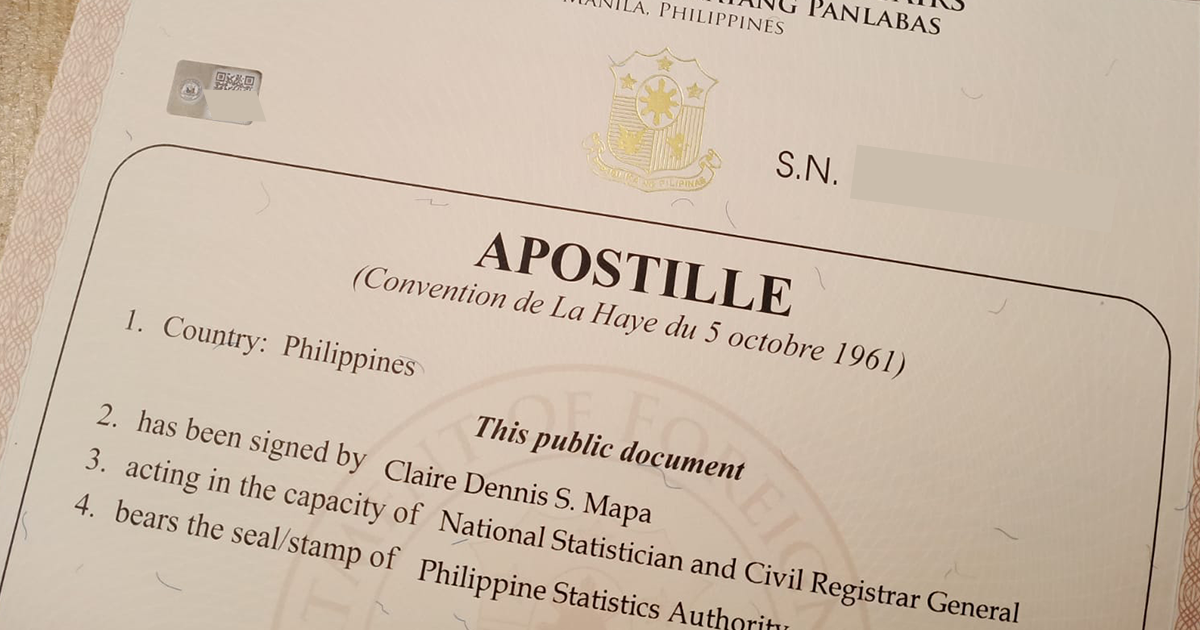
Where to get an Apostille or get a Document Authentication?
As per DFA Website, you go to the following DFA Offices:
DFA Main Consular Office
Macapagal Boulevard, Parañaque City
[email protected]
DFA CO-Northeast
Ali Mall Government Center Level 2
Ali Mall Cubao, Quezon City
[email protected]
DFA CO-East
7th Floor, Building C, SM Megamall,
EDSA cor. J Vargas Ave., Mandaluyong City
[email protected]
DFA CO-West
5th Floor, SM City Manila,
Conception St., Manila
[email protected]
DFA CO-South
4th Floor, Metro Alabang Town Center,
Alabang, Zapote Road, Muntinlupa City
[email protected]
DFA CO Pampanga
Robinson’s Place,
San Fernando, Pampanga
[email protected]
DFA CO Davao
3F SM Davao, Davao City
[email protected]
DFA CO Cebu
4th Level, Pacific Mall,
Mandaue City, Cebu
[email protected]
The DFA’s Consular Offices are open from 10:00 a.m. to 6:00 p.m., Monday to Saturday.
Steps for Document Authentication
1. Go to either office stated above and get a number from the Window. Remember, this is a government office, so try to dress properly; no slippers, sleeveless or shorts.
2. Fill-out Authentication form.
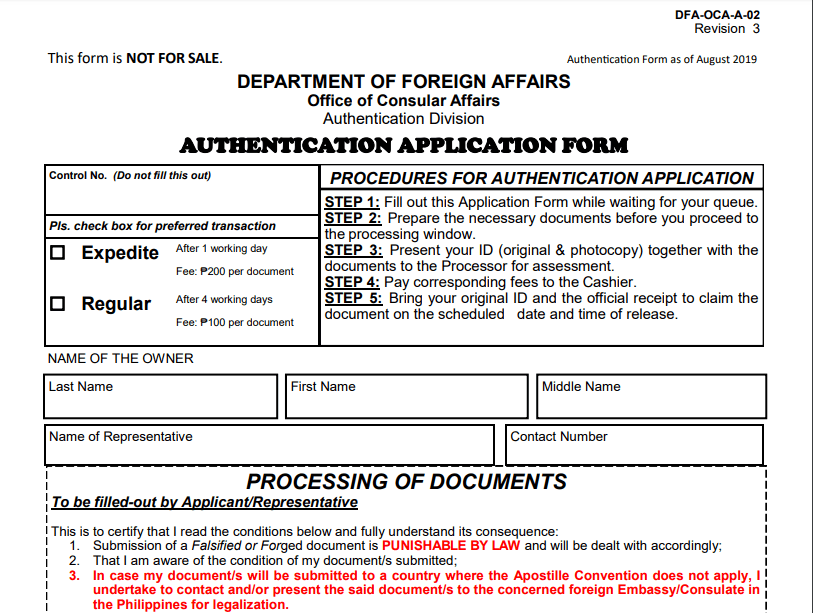
3. Get your documents ready (the one you want to get authenticated and your ID)
4. Present your ID (Original and Photocopy) with the documents you want to get verified to the processor for the assessment.
5. Go to the cashier to pay your fee (Php 100 per document for Regular and Php 200 per document for Expedite.)
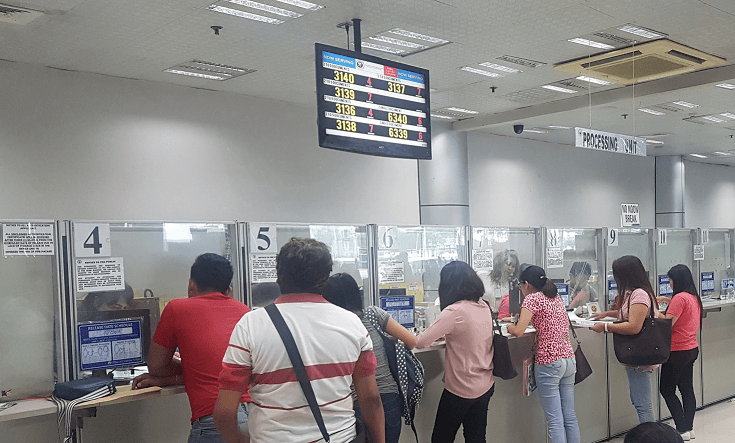
6. Bring your original ID and the official receipt on set release date and time to claim the document.
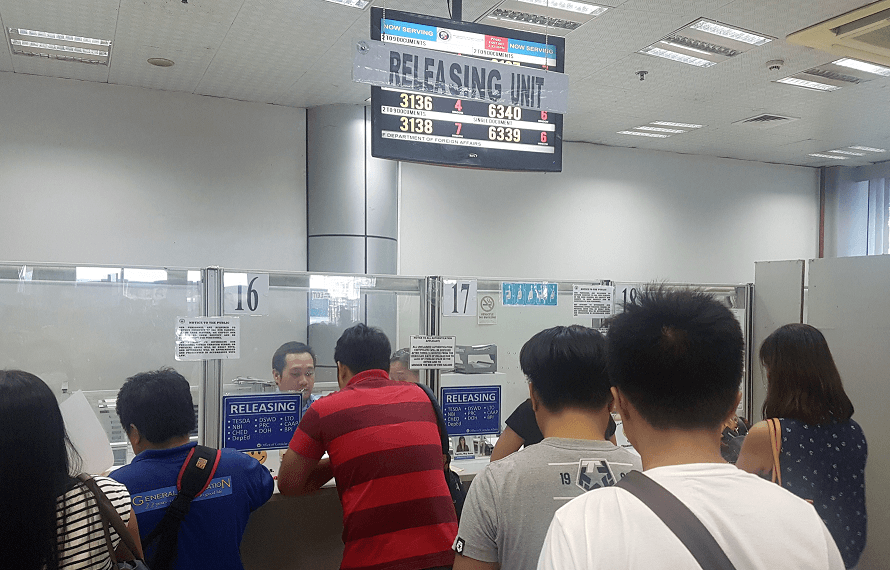
Please note again that if you are going to submit it to a country not a member of the Apostille Convention or where Philippine Documents with an Apostille are not yet accepted, you need to go to their Embassy or Consulate for Legalization.
So example, Canada needs yung authentication mo for your Birth Certificate, then after getting an Apostille in the DFA, you need to go to the Canadian embassy for your Birth Certificates’ Legalization.
Apostille Documents during the Pandemic
As per DFA, the public is encouraged to have their documents for authentication be delivered through courier services. With that you can avoid going out. On how to send it as well as the payment, you can communicate with the DFA Offices stated above.
If you want to process it yourself, then please make an appointment. For DFA ASEANA, e-mail, [email protected]. We also have the list for other offices above.
For more info, you can contact Department of Foreign Affair’s Facebook page as they reply.
The Features of an Apostille Document:
You can check the authenticity of the document through this website. Alternatively, you can check its features:
- QR Code (upper left portion)
- Eight Digit Keycode in the lower part of the certificate
- Electronic Sign of the Authentication Officer
- A Round gold sticker
FAQs for Apostille
1. I am based abroad, I want my documents authenticated or Apostilled, what do I do?
You can get an authorized representative to process the Apostillization for you in case you can’t apply personally.
2. Will an Apostille ruin my document?
No, it would not. An Apostille special certificate that is attached to your document and it isn’t a sticker so no worries.
3. I can’t find a country on the list, what do I do?
You need to present the document with Apostille to the country’s Embassy or Consulate in the Philippines for legalization. If there’s no Embassy in the Philippines, you may contact the nearest one for instructions on what to do.
4. Can I authenticate documents from another country?
No, only Philippine public documents are going to be Apostilled or Authenticated.
5. I already have an Authenticated Document with a “red ribbon,” it is still valid?
If you are passing to a country, not a member of the Apostille Convention, then that is okay. However, if it is for a country that is a member of the Apostille Convention then you may need an Apostille.
6. What is needed in case a representative applies on my behalf?
You representative must have an Authorization Letter (if minor, an Original Power of Attorney from Parents), photocopy of applicant’s valid ID (with signature), and original and photocopy of representative’s valid ID.
I hope that this will help you with your applications or requirements abroad. Indeed, an Apostille is better than the Red Ribbon since you can only go to a single place rather than the DFA Office plus the Foreign Embassy. If you need more help in your documents, feel free to browse our website as we have tourist application guides for Philippine Passport Holders and guides for government agencies like NBI, BIR, SSS, etc. Happy Browsing!

Are you on Pinterest? Pin these!

About the Writer

Hey, I’m Lyza! I once was a person who just imagined going to places “one day” but decided to pursue my dreams. My first travel abroad was in Japan, solo, last 2018, and fell in love with the journey since. I’m aiming to visit 10 countries before turning 30 and 2 new places in the Philippines every year. Besides traveling, I love organizing trips, photography, reading, and making new friends. Follow my adventures through my Instagram.

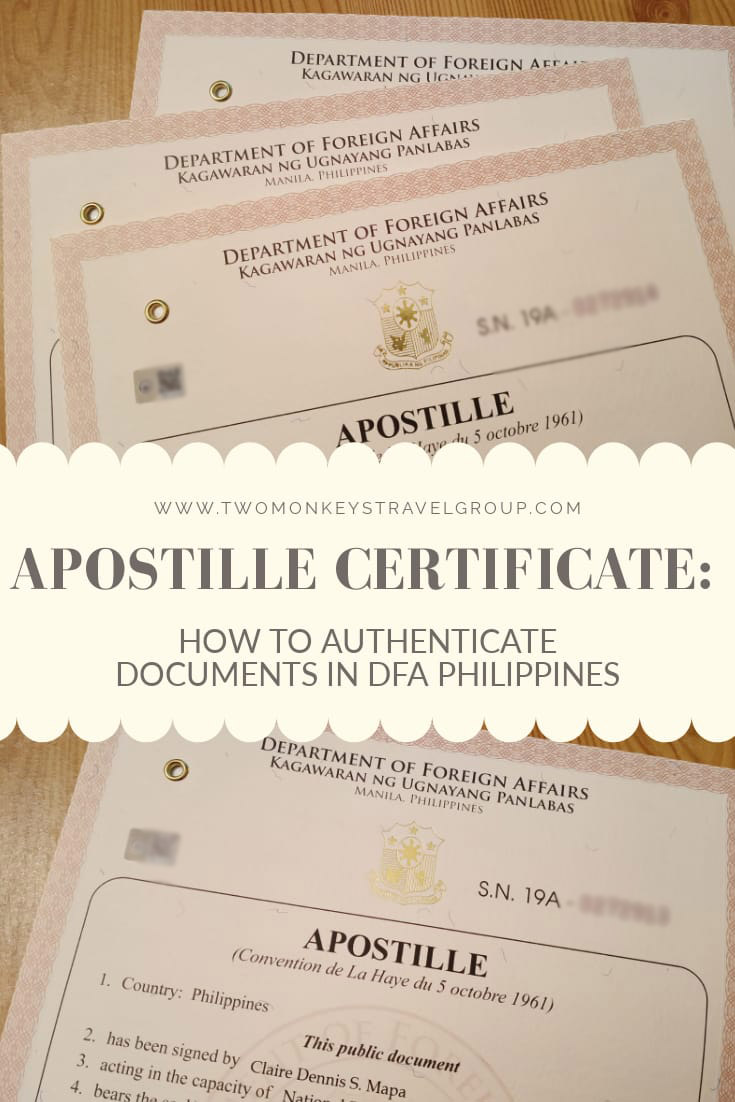
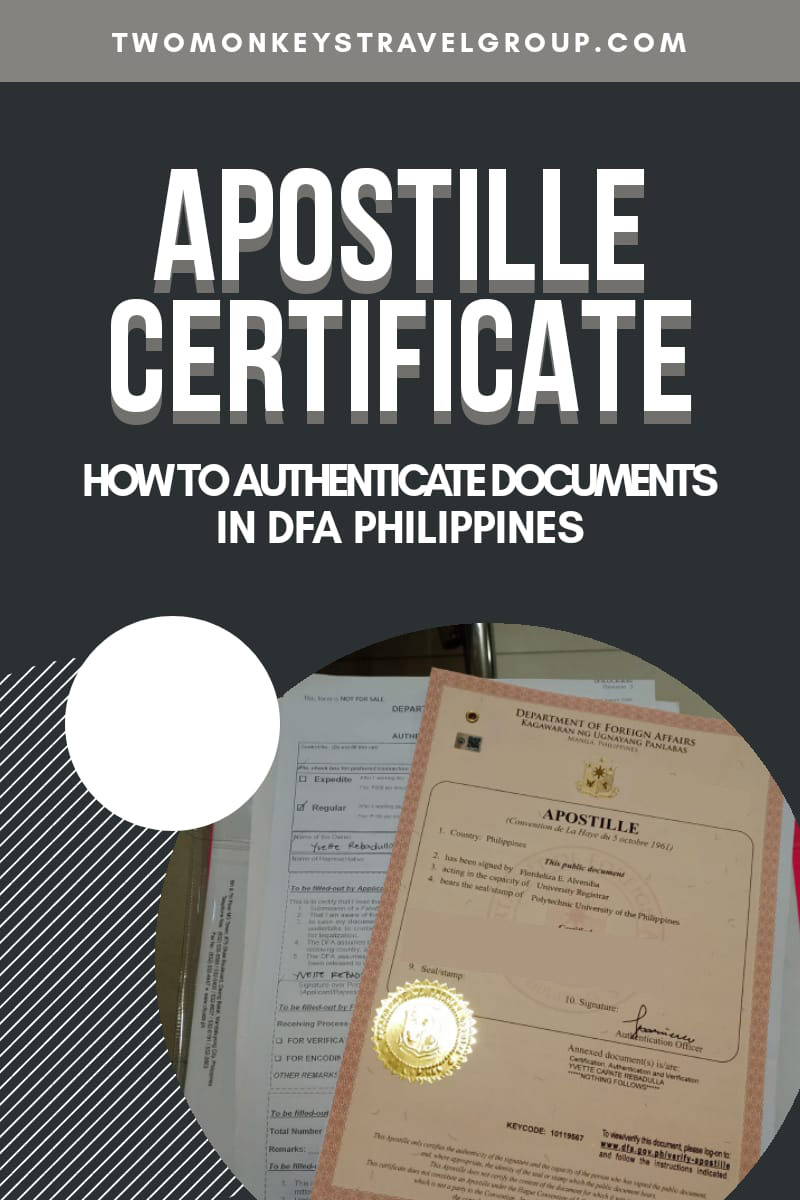
Hi po. Ask ko lang po if yung authorization letter if may representative, pwede po ba galing sa abroad sya then i scan lang? Or need yung original copy ng letter? Thanks. Di naman po minor so this authorization letter is enough po? No need for SPA? Salamat
Yes does my apostille certificate does bear any bar code and key code. Only serial number and gold seal.
Ano po need na requirements pag ipapa apostille ko birth certificate at cenomar ng kapatid ko?
Yung BC at Cenomar tapos Authorization letter at IDs
Hello ask ko lang po i have a friend living in turkey ako po ang napagkatiwalaan nyang mag asiskaso ng documento nya dito sa pilipinas ipapa appostile nya po yung mga documento in rush paano po yun ano pong gagawin kasi kailngan nya daw po kc baka daw expired na po kc id residency nya eh baka madeport na po sya.. Paano ko po sya matutulungan.. Pwede po ba ako kumuha ng rush appointment…ano po mga requirements bilang representative.. Sana po matulungan nyo po kami…
If Rush po, di po pwedeng friend – dapat immediate relative po.
Hello po. Di ko kasi nakita ang Canada sa mga bansa na nag Apostille,, ano dapat gawin if for Canada.
authentication po – after mag pa Apostille ka – punta ka sa Embassy ng Canada
Valid pa po ba ang apostilled documents nung 2019 and 2021 na ipa stamp sa UAE Embassy diyan sa Pinas?
paano po kapag nkapag pa red ribbon (TOR,diploma )na dati (2014) and im applying for apostille, back to zero ba( need ulit magrequest sa school ng records ) or need to update lang?
You will actually need a CAV po from CHED. Pumunta ako ng school ko para mag-request ng bago plus sila kumuha ng CAV from CHED.
sa baptismal certificate po, sino ang dapat affiant sa affidavit?
Hello, what paper size ang gagamitin for the photocopy of the document? Long, short or A4?
Hello po. Tanong ko lang po kinukuha na po ba agad ng DFA ang SPA sa pag file plang ng apostille? Or sa pag claim na? Gusto ko pa kase sana gamitin the nxt month ang SPA para sa pagkuha nman ng passport renewal ng anak ko. Salamat po.
Pwde po ba ipa appstile yung local civil registry na birth certh yung galing sa minisipyo hindi pa authenticated ng PSA pwde p ba? Salamat po sa sasagot
better clarify nlng po with the DFA
Hello! Kelangan ko po e Apostille ang birth certificate and cenomar for marriage. But im thinking ill send it thru DHL cause im here in Leyet now, usually how long does it take to process these documents po ba? Tnx and Godbless!
Hi po,ask ko lang if pag authorizatioan ang dala need pa ba ipa notarized?
Hindi daw po mabasa ng DFA yung NBI No. ko, for verification pa daw po? How long does it take po ba bago nila ma.verify kasi 2 weeks na po ako naghihintay wala parin po update. Thanks and sana masagot nyo po tanong ko. Good day!
Puede ba sa PHilippines ipa apostille ang SPA ng American citizen?Mayroon na pong signature yung taga US kong brother pero need pa ng authentication yung SPA. ano po ang kailangang gawin.
san po ginawa yung SPA? ipa-apostille sa country kung san ginawa
Pahelp naman po panu po mag pa appointment for nc2 appostile?
sa nearest DFA po with authority na mag-apostille
Paano Po ung mga documents ng anak Kong 8 years old and iba Kong documents gusto ko Po sanang mag pa apostille before Ang flight Namin sa February ,,need ko pa ba ng SPA if sa anak Kong 8 years old Kong anak I’m the mother Po.? Thank you and Sana Po ay mapansin nyo.
Tanong ko lang po kung pwedi lang po ba resibo nang NBI ang ipapasa o ipapakita ko sa DFA office Kasi po na hit po Yung NBi clearance ko at sa Feb 17 po schedule nang apostille ko ano po ba Ang dapat Gawin..??
Di po pwede, wala kasing document.
Hello, Once I got the apostille docs, how can i send it to Board of Nursing in USA, via DHL?
Can my representative go walk in any dfa for my live birth and cenomar for appostittle without appoiontment? Coz im here abroad getting married and i want my papers asap..is it okay to be walk in?
Thru online nadin Po . Depende Kung may letter of urgency Po pwedeng mag email po
Hi,can i get any suggestions po on how to get an apostille for birth certificate,authorized representative po kasi ako and plan ko po sana na ipadala sa kapatid ng may ari ng document yung apostille document nya since umuwi yung kapatid nya and balik nya po sa Italy ay Dec.2,kaso wala na pong slot hanggang December. I’m just worried lang na baka ma-expired na yung SPA at NBI(which is one of her presented ids) that time na di ko rin sure kung kailan magkakaroon ulit ng slot.
how many copies per document is needed for apostille?
it depends on you po
Hi .. may I ask if do I still need to get a PSA birth certificate again ..? Meron na po Kasi ako nun kaso matagal na po sya like more than a year na sya sakin I’ve heard po Kasi na PSA is valid for 6months Lang .. need ko po sya ipaappostile together with my cenomar..
Thank you for your response
God Bless
Hello ! Yung dhl ba pwd maka process sa apostle sa documents like TOR and Diploma Thank you po.
How can i get slot within the month of october 17 to november 2
please e-mail them po.
Hello po,pwede ko po ba gamitin or ipa apostille ung red ribboned documents ko?
Good day,
I am already in abroad and I want to change to my change my surname from married to single,, the reason was he passed away last 2011, what are the documents needed to change my status,,, Is Apostille enough to present as my document? Thank you
Abd I’m Waiting for ir your reply.
We don’t know the rules on reverting back.
Hi, I just want to know, is there any additional requirements if my school papers are on my maiden name and my id’s are on my married name? Also, is there validity for CAV? my school papers have CAV last 2018. I hope u can clarify this and it will be very much appreciated.
Hello po, is it okay to get SPA in behalf of my dad who’s OFW?
Hi Lyza,
Ask ko lng if the DHL does process apostilli on my behalf?
Hi, Lyza. Will I get my diploma and transcript back from DFA once I claim the authentication from them?
My expat has a marriage certificate that needs to be apostille. My online appointment is Nov. 2. His visa will expire on Sept 19. What is the best solution on this for faster processing? Thank you
Contact DFA through e-mail.
Ano po next step after makakuha ng stamp from Thai embassy for my Apostille document?
Send mo na po saan required yuung document mo.
Gud pm,how to apply apostille online?
appointment lng po is online
hi,, i have an scheduled appointments for nbi appostile on September 2021,, but i needed my documents for this month of August. How can apply for faster process of the documents if there’s no available slot ?
please e-mail the DFA.
Do i still need to bring the documents in RTC for notarization before going to DFA for apostille?
Hi! Does dfa accepts authorization letter that is scan and printed? And not the original one? A representative will process it for me since I’m out of the country.
Hope to hear from you. Thank you!
i think it’s okay if you are out of the country. But you can double check by messaging them through FB
I got my birth certificate and cenomar last oct 2020. Are they accepting this for apostille?
Please check the requirement on where you will pass it, as it is usually 6 months for the cenomar.
paano pang nkapag red ribbon na dati (2014) and im applying for apostille, back to zero ba or need to update lang? thanks..
the same process po, pero wala na yung legalization sa other countries. Mas madali pa po ito sa red ribbon
Hi i am outside Ph and i urgently needed my birthcertificate with apostile stamp, I ask my cousin who is currently in Manila to do my apostille stamp, will it be smooth process? what does my cousin needed for proof of authorization? thank you for any advices.
He will only need an authorization letter
Hi miss lyza,is it ok that only a copy of training certificate to be send and apostille or it need an original copy of the said document?
Thank you so much
Certified True Copy is acceptable.
Hi!
Thank you so much for the info you gave. It is a big help.
I have a question. I sent my original employee certificates and trainings abroad already to my employer abroad. Can I apostillzed my documents here in the Philippines even if they are only scan copies? Note, they are already Notarized by a private lawyer.
Thank you very much in advance for your answer.
GOD bless you!
It’s too technical for me po, it’s better to contact the DFA po if ever.
Hello. I just want to ask how to contact or book an appointment in UAE embassy? Can DHL process it after I got my Apostille document? UAE is not included in countries under Apostille. Thank you.
Try this po – UAE Embassy in Manila. +63288221777. +6325551843. For DHL Services, you will need to contact them po.
Hi…if my grandma will apostille my aunt(her daughter from luxembourg) PSA, does she need to have authorization letter from my aunt?
I’m on Brazil and I need to apostille some documents originally from the Phillippines, how can I do it?
If you are abroad, you can ask a relative in the Philippines to do it on your behalf. 🙂
I am applying on behalf of my Aunt documents particularly on Birth certificate. I just want to ask.
What are the details should I include in writing an authorization letter and what are other documents should I attached and where should I submit this papers.? Can I process this document via DHL?
This is such an informative site. Thank you for putting it all together. However, I am still confused on where and how I can get my Birth Cert Apostille. I am getting married in Serbia and the court needs “Original birth certificate from Philippines certified with Apostille stamp and a Certificate of free marriage status from Philippines certified with Apostille stamp.” Where do I start? Please help, I truly appreiciate it.
You need to go to PSA to get all the documents then go to DFA for the apostilled.
You can read these 3 Ways on How to get a PSA Birth Certificate – Walk In and Online for Pinoys Abroad and How to get a CENOMAR in the Philippines (CErtificate of NO MARriage). Just send it to a relative in the PH and let them go to a DFA office for an apostille.
Hi Lyza, My wife and I are currently in Spain. We need our marriage certificate apostilled urgently to get Spanish residency. This cannot be done online. The DFA suggested we should get a courier such as DFL to process the documents for us. But when I spoke to DFL they said all they can do is deliver a document, then pick it up after it has been apostilled. But they won’t get involved in processing it. Huge problem! How do I pay DFA, and will they do the processing if DFL delivers the document?
Do you have relatives there? You can get your PSA Marriage certificate online and send it to them. Then, they can have an appointment at the DFA and do it on your behalf. Then, it can be sent to Spain through your courier.
Good day, I would like to apostille my birth certificate and NBI clearance. 12 of this month they have available date?
Tanong ko lang po. Need po ba yong original copies ng mga papers na ipapa apostilled? Salamat
My son lives in Fes , Morocco. I need his birth certificate apostilled. Is there any way we could apply online?Unfortunately, I have no one in the Philippines to do it for us. My family is in USA.
Mag email ka muna sa kanila mam .tas may branch silang ibibigay kung san ka malapit . As if tanung kajan sa DFA BACOLOD kung meron man
Hello pa ask q lng pde po b thru courier service mgprocess ng apostille or need ng personal appearance s dfa tnx po.
How do i get an appointment for an authentication of documents?
Hello. Is it ok to claim the apostille document after the date specified by DFA? My document will be released by February 11. Is it ok to get it by Feb 15 onwards. Thank you,
Yes 🙂
Hi mam panu po mag pa appointment sa dfa ng documents mam pahingi naman po ng link
ask ko lang po paano po mag lakad ng apostille need pa po ba mag scedule
Hello po, tanong ko lang po pano po mag pa authenticate during this pandemic? At nasa bacolod pa po ako. Thank you po.
Hi Lyza, since I am out of the country I should get a SPA for my son’s birth certificate to be apostilled. During this time of pandemic, do you think there is a delay in releasing of the apostilled document? It says, 1 working day for express.
You can get get one online and send it to a relative; for the apostille, only an authorization is needed.
Ano po website online appointment for apostille certificate?
I want to authenticate my husbands documents what are my requirements?Thanks
Nasa article po yung requirements at steps.
Hi i am karen torres graf i would ask how can i apostail becuase need in the manila embassy for my husband dead, please reply me asap, thank you
Where are you based?
Hello miss Lyza, thank you for your very detailed blog about this. I woul just like to ask about the representatives applying on my behalf, can it be someone i am not related to like a friend?
Thank you very much
Hi sir/mam, ask ko lng pagfinish ng apostille sa dfa sino pwedeng magsend sa board of nursing sa california.kasi nakalagay sa letter nila na kahit member of the family,school or third party di pwede.can the dfa send that apostilled documents directly.thanks
Paano ko po iprocess yung apostille ng nanay ko. Nasa jordan po sya ngayun at need nya po ng apostille. Paano po ako makkakuha ng apostille para sa kanya? Thank you po
Just to confirm, nag eexpire po ba ang na apostille na documents?
I am in UAE i brought my apostilled documents here, and upon checking hindi apostille country ang UAE, so does that mean I need to send my documents sa Pinas just to be authenticated directly ng UAE embassy sa pinas, just so then it can be authenticated here sa UAE?
Or kung may expiry man do i have to repeat the whole process again on going to DFA?
I already have an Authenticated Document with a “red ribbon,” that I used in Saudi Arabia. in 2011 then I went on final exit and again used it in 2018 to enter Saudi Arabia with my Bahrain company. It is still valid or can I use it again? I have a job offer in Saudi Arabia.
Pwede ba walk in sa DFA Aseana for Apostille?
online appointment dfa
Ano Po ung CANA ? Mag papa red ribbon Po sana ako ng mga certificate ko from PSA . Living in abroad ( Japan )
Hi. I still have my apostille documents last March 2020, does apostille have an expiration?
I have same question also,dahil ang pagkakaalam ko yung ordinary CENOMAR copy from PSA ang valid till 6months from the date of issued so kung expired na since last march 2020 pa ito at till now di pa nagagamit,ang question is expired din ba and naka apostillized na CENOMAR?or magpaprocess ulit?I’m living abroad kaya expectation din na matatagalan ulit ang pagkuha at processing. Needpa kSi mg apply ng SPA sa Embassy sa lugar ko then saka ipapasa sa pinas to DFA.
I wasted my time going to an arrogant public attorney Ramil Abing.
He demanded that all documents be presented all at once without wasting his time and then said was he’s not accepting it after looking at only two papers from a heap of files.
Wow, why assume a public position and get paid by taxpayers’ money without explaining why you are not accepting it?
I was treated like my request was too petty for him to handle as a proud lawyer so he has to say ‘no’ na parang nagmemenopause na babae. Kalalaking tao. Is that it? No explanation is needed to someone who is paying taxes that go to the salary he is receiving monthly.
IMHO, my impression of him was the work was unfamiliar for him to handle. So why handle it if he doesn’t know how?
It took another public lawyer from the palace of justice (who was accommodating and friendly to provide advice as to where I can get help) and a humble Cebu provincial capitol guard to explain that public lawyers are not allowed to notarize public docs for Apostille.
So, folks, please go to a private lawyer.
Hi asking for information lang po, usually how much yung fee sa CANA? Thank you!
They already send “Authentication Appointment” but can’t open the link on below. They can’t set my appointment because they said i need to give my information first but the problem is.. Why can’t open the link on below
please contact the DFA Facebook Page
Atty LM Fernandez just made good money out of me. His clerical assistant must have also read from here that it is Php100 per document which is so NOT true! Ang Pilipinong aboagado ay ayaw magpalamang at sobra sobra ang hinging notarial fee;
I only paid a total of Php200 to the DFA for two sets of documents (Php100 for my school TOR that has a total of 11 pages already certified by CHED plus Php 100 for 15 pages of docs notarized by the lawyer that needed CANA).
CHED fee as of Oct 2020 did not reach Php300 and CANA was only Php50. But, can you imagine paying Php3300 for the notarization to a private lawyer for the misleading “Php100 per document” fee information?
Kanino po kayo nag request ng CANA? Sabi po sakin ng isang notary na kausap ko 3k daw po ung CANA at notary, mapagsamantala ito
It was not mentioned here that because of the present pandemic, one doesn’t need to go to DFA for the 1st step, but rather submit all docs to DFA via email and wait for the reply indicating schedule (date and time) of submission to DFA. Sayang naman po. I wasted the day of travel and expenses in going there. Hope you can indicate this in your website. Thanks so much
Hi po what kind of docs po? Yung po bang ipapa-apostille or yung authentication form po? ANo po ang email ng DFA Pampanga? Down po kasi ang website ng consular Salamat po
[email protected]
Ang sabi po sa dfa ay mag email para sa appointment for apostille. Paano po kaya/ano po ang mga information na dapat ilagay sa email? Salamat po
You can send in your name, purpose of appointment (e.g. Apostille – Birth Certificate) and date and time na pupunta ka, then wait for confirmation nila
My filipino cousin was married in UAE, she has to apostille her marriage certificate. Ako po yung ino’authorize nya na maging representative dito sa Pinas. So dapat po ba niya ipadala yung orig copy ng marriage cert nya dito sa Pinas para masama sa isusubmit Kong document? And is it possible to go to any branch of dfa like Calaciao, Pangasinan
It’s not a Philippine Document, might as well let her try sa Philippine Embassy sa UAE or in their country
Hello po Magandang umaga magoa authenticate lng me ng NBI clearance po at dito ako sa cagayan de oro city address ko paano ba kukuha ng schedule
please contact DFA CDO po or the nearest DFA na nag authenticate ng docs nyo, which is most likely davao
Paano po ba ipasend directly yung apostille Directly sa agency. May option po ba na ganito. Required kasi na DFA mismo ang magsend sa kanila.
Good day . may we know how to process online appointment of authentication in dfa .thanx
Good evening po.
Inquire lng po kung meron po ba validity ang apostille documents from DFA.
Ang validity kasi ng authentication is 5 years.
Salamat po.
Ask ko po if kailangan pa ba mg appoinment if magpa apostille ng PSA document?
pwede po ba mag process ng apostille via DHL? wala kasi apostille service ang DFA cagayan de oro.
Hi im the, representative of my sister in law for doing apostille nbi, i want to know wht is the requirements before i go to dfa. And i want to know if they need an online apointment of the aplicant, it need or not?
Hi,im representative of my friend,kukuha po ako ng apostille ano po requirements ang kailangan dalhin sa dfa,regular po ba ang process dun or online process,thanks
Hi,i’m in korea right now,i need to get Appostille that it means our merriage are legal in the philippines,.so how do i do???did i can get in south korea philippine embassy?
Try contacting the Philippine Embassy in South Korea – http://www.philembassy-seoul.com/
Pagpapa Appointment po ako ng Pagpa Apostille ng documents ko NBI and Medical ko thanks po.
Good pm paano mag appointment ng apostille hirap makapasok ng website nyo. thanks…
Thanks, this was very helpful for me and foer my representative who will do the processing for me.
Hello!!!
May i asked what is the requirements that needs if only representative will get apostille for me?
Hello anu po requirements kelangan dalhin ng representative?
How can I avail of your services? I have court documents for translation into Chinese also court documents for authentication with DFA.
Hi . I am just curious if online appointment is required before visiting any DFA branch mentioned above. I’ll greatly appreciate your response . Thank you!
It’s better to call for an appointment ahead, you can check the contact number of the nearest DFA Branch through google.
I have my certified diploma and Transcript of Record requested from school last 2008 and it was also CAV from CHED. Can I use this documents to Apostille? Or do I need to request a fresh copy of certified diploma and TOR again and have it CAV from CHED? This is for my student visa requirements.
Appreciate your response.
got my apostille documents, but when i try to verify it, ndi sya maverify sa site ng dfa.. already typed the apostille no and keycode pero ayaw lumabas nung verfified apostille.. what will i do? thanks!
Nandito ako sa France and for my work contract, I need to have my birth certificate legalized/apostilled to get social insurance card. Do I need to send the original document to the Philippines for that? Salamat
Hi po! Do I need to required an SPA from the Embassy if Im applying from abroad thru my Authorized Representative or just an Authorization letter will do?
As Per the article and the website, an authorization letter is okay.
I am currently out of the country and would like my mother to process my school documents, do i have to send an SPA or an authorization letter is accepted?
Authorization Letter wil do as per their website, however, if you ar a minor, then an SPA will be needed
HOW TO GET AN APPOINTMENT ?
E-mail or contact the nearest DFA po.
hello po
ask ko lang po ang site ung pag papa appointment para sa TOR claim kailanga pa daw po kasing my appoinment nagyon eh di ko po makita kung san ang nakikita ko lang na may appoinment is ung para sa passport…
please help po… thank you
You can check the site of the nearest DFA office po, try google or message them sa FB.
Follow up ko lng po appointment ko
For passport of my son at Apostille ( birth,marriage,delath certificate and advisory on marriage) wala parin po nadating sa email ko thanks po
contact DFA po as we are not affiliated with them.
Hi, kapag nagpanotarize po ako ng COE, need po bang sa same city ng work ko or not necessarily? Thank you
Hindi naman po. Ako sa Makati and Mandaluyong work ko pero sa Marikina ako nagpa notarized.
Hi
Just wanna know do i need to make appointment online if magpapaapostile ng documents?
Thank you
Better check po the DFA office near you if you need an appointment or walk-in is available.
Hi po pwede po magtanong?by oppointment po ba sa dfa?mag papa aunthentication po sana ako.thanks
yes you need an appointment.
Yes required magpaappointment now.
what is the link for NBI apositile appointment. Thank you
Hi, I went to Ched already, they gave me an claiming stub with given date.
to be pick up at DFA ali mall.
Do still need to make an appointment to dfa again for another process?
Thank u jl
yes
Can I apply thrue online and submit all the requirement by courier?
The letter authority for a representative should be notarized or not? Is it a simple letter authority? Thanks
It’s recommended to have it notarized especially as you are dealing with a government agency.
Hello.Can I make a request an apostille birthcert online even I am here in Japan?
Hello po. Ang Apostille po b kulay blue? Nakapag red ribbon kase yung friend ko, then ang binigay apostille pero pula po yung boarder.
Ilang years po valid ang red ribbon apostille po?
Please response po.
Hi. I’m from Naval Biliran and because of the pandemic I can’t go to cebu for me to have my documents apostille but I know someone who is in Cebu. Can i let someone do it for me? Thanks for the reply. God bless
You’ll need an SPA. Have you tried Tacloban?
Hello po sir,Pwede po bang mag pa appoinment para po sa apostile ng documents ko ( birth certificate,marriage certificate,and police clearance)? Or pwedeng walk in na pupunta diyan para ipa apostile sir?
It’s better to contact the nearest DFA office po.
Pwde po ba mag walk-n na kuha ng apostille kahit dina po ako mag pa online ng pila? Ilang days po makuha and my cut off po ba ang pila pag kukuha sa my Marquee mall Angeles? Ang authorization ko po ba na dalhin need paba dpat SPA or kahit hindi na po? Slamat po sa sasagot sana my mkapansin po ng tanung ko
Normal authorization letter will do. Appointment is required.
Hi,
Tanong ko lang po, iisa lng po ba apointment sa passports at apostle
Thank you po sa sasagot
Open na po ba dfa alabang para mag pa apostille at pwede po ba ang walk in lang o mag pa schedule pa para I submit yun documents? Salamat.
Mag walk in na lang ba pag mag pa apostillize ng NBI certificate o mag pa schedule pa para ma I submit yun document? Salamat.
Open po ba DFA for apostille ?
nasa UAE po yung friend ko. need po ba SPA nya ako or authorization letter na naka notaryo o letter lang po? salamat
hello po! ung naka red ribbon po ba last 2018, pwde po ba yun ang dalhin para ipa apostile? thanks po
Greetings!
Need pa po ba ng SPa to Apostille my cenomar?Nandito po kasi ako sa finland at yong sister ko po sa philippines ang mgproprocess.Anu po ba ang dapat niyang dalhin sa Dfa and need din po ba na palegalised ang cenomar?
Maraming salamat po.
Hi, I am now in Korea po tapos I need my nbi and diploma apostilled. Not a minor, so do I need to get an SPA pa po or just an authorization letter lng po?
I really like the content of your blog it helps a lot.☺️
My query is all about business?
I just want to ask on how does agencies (who process Apostilled documents of there clients abroad) became it legally to process there clients on there behalf? Do you have any idea of my query? I was planning to start my own agency like that but I need to figure out all of those things how to start it and ofcourse I would like to do it legally.
Thank you so much☺️
God bless you more and continue making blogs☺️
Hello po! Possible po ba na ang DFA mismo ang mag send ng apostilled diploma sa California Board of Nursing? Yon po kasi ang requirements ng BON. Salamat po sa sasagot.
Yung function po ng DFA is to give you ang apostilled diploma, you can send it using DHL or Fedex po.
Thanks for this informative read. Ask ko lang po kung pde sa dfa tuguegarao magprocess ng apostille?o yung mga nakastate lang sa taas ang pde?thank you
Wow.. thank you.. clear na clear po
Pwede po ba nmin pa process ang dfa apostille. Ipapadeliver nlng po ito sa designated dfa branch? Kalakip ang lahat ng requirements na need icomply
May brother ako from Alaska. He need his birthcertificate with this validity apostille. Meron po bang pwedeng nag process nito for him.
You can ask a relative or anyone in the Philippines to go to a DFA office po for Apostillation.
Maam, valid id lang ba at marriage contract yung dalhin sa dfa for apostille?
Ma’am original copy po ba ng document and ina attach sa apostille?
Magpapa apostille po kasi ako ng birth and marriage certificate. One vlog mentioned nagpa photocopy siya at un ung nilagay but her original copy of cenomar was attached instead. Naguguluhan lang po
Mas better if original or certified true copy. You can get copies of your birth and marriage certificates at PSA.
I need a warranty deed notarized by an apostille in Cebu City. Is this a service you can provide?
Ongoing quarantine.is there online application for apostille.
This month its already open for Birth certificate Apostille pls answer my comment. Thank you
Hello, you can check the DFA office near you if they are already open for such services.